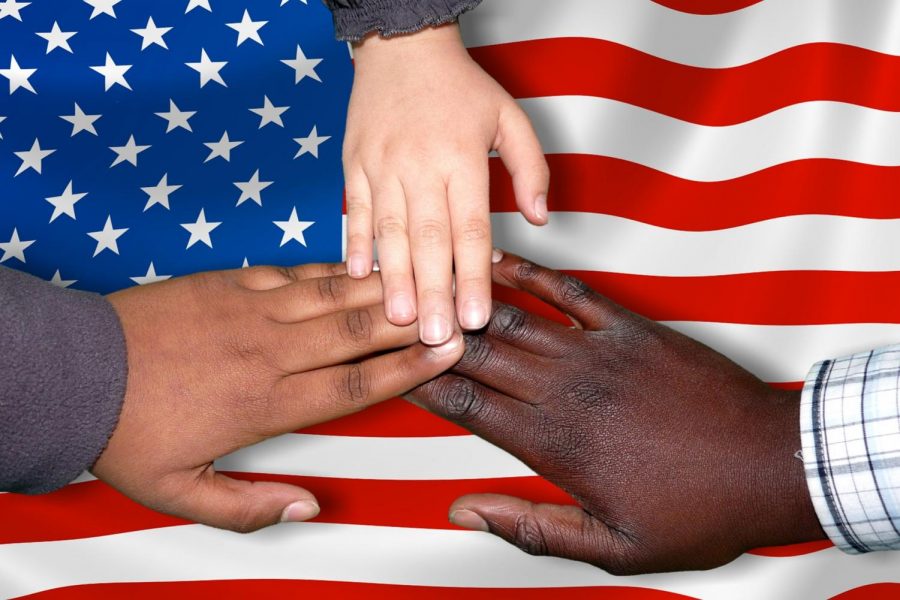Discussions in Diversity
February 4, 2021
Augustana College associate professor of Sociology, Anthropology, and Social Welfare, Paul Croll started the teleconference by telling those in attendance that his life experience and point of view is that of a middle-aged white male. Interested in racial equality – but approaching the subject from a place of social dominance – Prof. Croll wanted to do more to try to help.
What Prof. Croll studies is the “invisibility of whiteness” – that is that theory that white Americans generally “don’t know” about ‘whiteness’. White people often do not see, hear, think about, or have conversations about “whiteness”.
Two promotional posters were used to illustrate his point. The first was from Marvel’s ‘Avenger’s’ which was marketed as a simple superhero film. The next promotional post was from Marvel’s ‘Black Panther’ – which was seen and described by many as a “black” superhero film instead of just another superhero film.
The study of ‘white privilege’ challenges the idea that being white is “normal” or “regular” and presents the theory that being white puts an individual in a position of inherent advantage over non-whites.
In the United States, ‘whiteness’ is perceived as being ‘normal’. Meaning there are the characteristics of being a White American, and then there is ‘everything else’. Professor Croll says it is more about those who are “advantaged” vs. “disadvantaged.”
How white privilege is experienced
One of the most consistent themes in American culture is the idea that with hard work, persistence – and a little bit of luck – White Americans achieved ‘The American Dream’. The study of ‘White Privilege’ explores how many of those same people had a family member that owned a business, or another type of generational wealth such and even the practice of fair lending. Too often, the flow chart of ‘Hard luck >Effort>Taking advantage of opportunities’ leaves out the cash loan from a relative, the grandfather that has multi-million dollar farmland, or a factory that had an unwritten ‘No Hire’ policy.
Naturally, some people will have a negative emotional response to some of these points. The pain, anger, and guilt challenge the belief that we live in a fair or just world. The theory further goes against traditional notions of American meritocracy or the notion that one just must ‘work hard’ and every American begins at the same starting point with a similar set of tools.
Who can claim the American identity?
“Where are you from – no, where are you REALLY from?”
The question in its context almost always comes off condescending and can be labeled by many as a microaggression. Asian-Americans most commonly on the receiving end of such a question while many White Americans would experience an immense amount of confusion if they were to hear the same. The question of whiteness and its inherent privilege was catapulted into the center of conversation on Jan. 6, 2021. The Capitol riots resulted in the death of five people – one of those dead including a police officer. What becomes apparent is the fact that the United States seems to have different justice systems for different groups of rioters. Many who were simply in the same general area of Black Lives Matter protests were rounded up and charged with serious crimes. Compare that to the rioters at the Capitol where there is almost no public discussion, and seemingly very little government outcry.
During an open discussion at the conclusion of the seminar, those in attendance were asked to talk about the experience of living in a White America.
When a black teacher shows films with main cast and characters who are not predominantly white, she inevitably always hears the complaint that she is “teaching too much black stuff” – while a white professor chimed in to add that the response to their showing of the same film receives the praise of “Wow – you’re so diverse!”
One of the most interesting parts of the discussion was the research behind African immigrants who make a point to set themselves apart from African Americans. The distinction, some theorize, comes from the notion that they themselves realize that the Black American is subjected to some inherent disadvantage.
With his closing words, Professor Croll stated that if there is to be a change, it will involve many uncomfortable conversations. It will take more than a tweet, a hashtag, or a few comments on a thread.
“If we want to make a change, then we really have to step up – even at our personal cost.”
